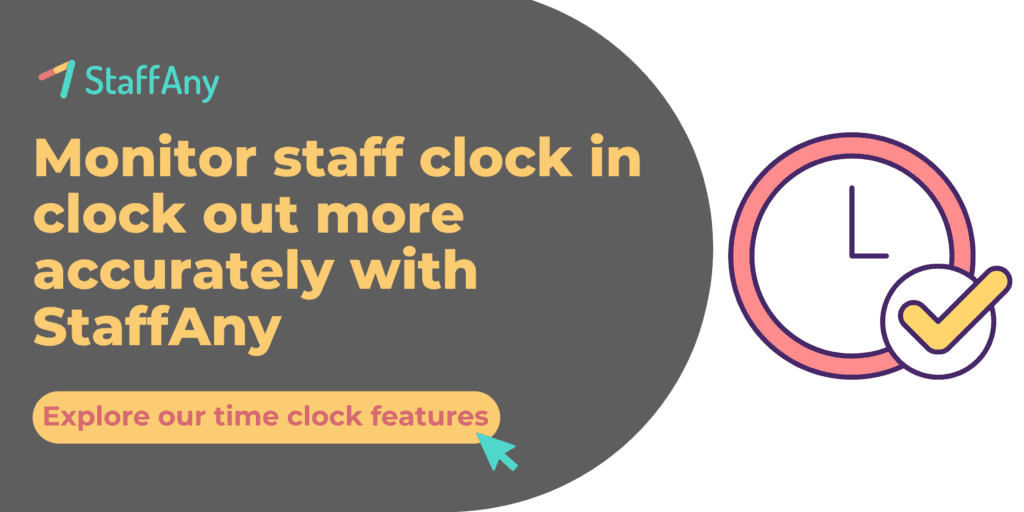In the hustle and bustle of our daily work lives, it’s common to forget to clock out occasionally. Whether it’s due to a hectic schedule, distractions, or just a simple lapse in memory, failing to log your work hours accurately can have consequences. It can affect your paycheck, legal compliance, and even your personal productivity.
In this article, we’ll explore the importance of clocking out, what to do if you forget, and offer some helpful tips and tricks to ensure it doesn’t happen again. So, let’s dive in and discover how to prevent those pesky missed clock-outs!
Why Is Clocking Out Important?
In the fast-paced realm of F&B businesses, precise timekeeping holds a particular significance. The nature of the F&B industry adds another layer of complexity to the necessity of clocking out accurately. Let’s explore some key reasons why clocking out is important.
1. Timely Staff Rotation
In the dynamic environment of an F&B establishment, ensuring that staff rotates at the right times is vital. Precise clock-out records enable managers to orchestrate smooth transitions between shifts, preventing staffing gaps and guaranteeing that there’s always adequate coverage during peak hours.
2. Compliance with Labour Regulations
The F&B industry is often subject to stringent labour regulations and overtime policies. Accurate clock-out records are not only crucial for ensuring employees are compensated fairly but also for keeping the business in compliance with legal requirements. This is particularly relevant in industries where working hours are closely monitored.
3. Enhancing Customer Service
For F&B businesses, customer service is paramount. Knowing when staff members are on or off the clock allows managers to optimise work schedules to align with peak business hours. This ensures that the right number of staff is available during busy periods, enhancing customer service and satisfaction.
Read more: Why Attendance Matters at Work? 11 Ways to Improve
What to Do if You Forget to Clock-Out?
In the event that you find yourself in the unfortunate situation of forgetting to clock-out, it’s essential to know how to rectify the oversight. Here are some general steps to take when you forget to clock-out, ensuring that you can handle the situation effectively and professionally.
1. Notify Your Supervisor
The moment you realise you’ve forgotten to clock-out, it’s essential to inform your supervisor or manager promptly. Transparency is key, and they will appreciate your honesty. Your supervisor can then make a note of your situation and take appropriate action to ensure you’re compensated correctly. Open communication is fundamental in resolving this issue, as it enables your supervisor to take the necessary steps to correct any discrepancies.
2. Provide Accurate Information About Your Hours Worked
When you notify your supervisor, be ready to provide accurate information about the hours you’ve worked. This might involve checking your work records, shift schedules, or any other documentation to ensure the hours you report are as precise as possible. Accurate information helps in two ways: it allows your employer to adjust your pay correctly, and it prevents misunderstandings that may arise later regarding your working hours.
3. Follow Company Procedures
Most F&B businesses have specific procedures in place for handling situations like forgotten clock-outs. These procedures may involve filling out a form, contacting HR, or using a particular software or system to correct the oversight.
Be sure to follow your company’s guidelines to resolve the issue effectively. Company procedures are designed to ensure consistency and fairness in how these situations are handled, so adhering to them is crucial for a smooth resolution.
Read more: 10 Tips for Managing Employee Absence
Tips and Tricks for Remembering to Clock-Out
Preventing the forgetfulness of failing to clock out is undoubtedly the best action. Here are several practical tips and tricks to help you remember to clock out consistently.
1. Set Alarms or Reminders
Utilise the technology at your fingertips and set alarms or reminders on your smartphone, computer, or other devices for your clock-out time. These gentle nudges will help you stay on track and ensure you don’t lose track of time amid your busy workday.
2. Create a Routine
Establish a clocking-in and clocking-out routine. Make it a habit to clock in when you start your shift and clock out when you finish. Consistency is key to forming a memory pattern, and eventually, it will become second nature.
3. Use Technology
Many modern workplaces offer clocking-in and clocking-out systems that use biometrics, such as fingerprints or facial recognition. Embrace these technologies if available to you, as they can make the process more convenient and foolproof.
4. Keep a Backup Record
In addition to your workplace’s timekeeping system, maintain a personal record of your work hours. This backup can be a simple notebook or a digital document. It’s especially useful if your company’s clock-in and clock-out system is unreliable, providing you with a handy reference in case discrepancies arise.
5. Take Regular Breaks
Don’t forget to take regular breaks during your workday. Short breaks can help you stay alert and reduce the chances of absentmindedly missing your clock-out time. A quick breather not only boosts your productivity but also serves as a built-in reminder to check your clock-out time when you return to work.
Read more: 10 Common Problems in Restaurant Management
Prevent Forgetting to Clock-Out with StaffAny’s Time Attendance Software
In the fast-paced world of F&B business, where every second counts, forgetting to clock-out can disrupt the smooth flow of operations. But fear not, as there’s a solution that goes beyond conventional timekeeping methods. StaffAny’s Time Attendance Software is a comprehensive tool designed to prevent the pitfalls of forgetting to clock-out and to revolutionise the way businesses manage their workforce. Let’s explore how StaffAny can be the game-changer you need.
1.Secure Clock-In
Security is paramount, and StaffAny understands this. The software offers a variety of secure clock-in methods tailored to your specific needs. From facial recognition to other advanced technologies, StaffAny ensures that each clock-in is accurate and reliable. By enhancing security measures, this feature not only prevents time theft but also safeguards against instances of forgetfulness that may lead to missed clock-outs.
2. Seamlessly Track Time Across Multiple Sites
For businesses with multiple locations, tracking time can be a logistical challenge. StaffAny simplifies this process by allowing employees to clock in at different locations. The system neatly categorises work hours, making transitions between sites effortless. By providing a seamless solution for businesses with multiple locations, StaffAny ensures that the intricacies of managing workforce time across diverse settings do not lead to forgotten clock-outs.
3. Latest Cloud Technology
StaffAny brings time tracking into the 21st century with its Cloud Clock-In Technology. Say goodbye to expensive hardware installations and hello to a seamless experience. By allowing staff to clock in using their mobile devices, this feature not only simplifies the process but also eliminates the possibility of forgetting to clock out. The cloud-based system ensures that attendance data is accessible in real time, bridging the gap between HR and operations.
By seamlessly integrating StaffAny’s advanced features, this software can ensure accurate timekeeping and address the broader challenges of workforce management. So, if you’re looking to enhance your business’s efficiency, eliminate the risk of forgotten clock-outs, and foster a culture of accountability, StaffAny is your answer. Connect with StaffAny today and experience a revolution in workforce management!












